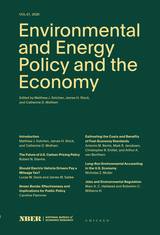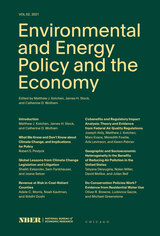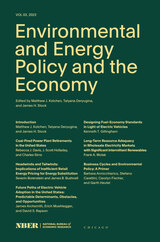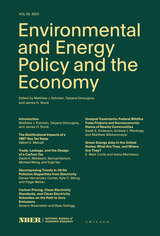4 books by Kotchen, Matthew J.

Environmental and Energy Policy and the Economy
Volume 1
Edited by Matthew J. Kotchen, James H. Stock, and Catherine D. Wolfram
University of Chicago Press Journals, 2020
This volume presents six new papers on environmental/energy economics and policy. Robert Stavins evaluates carbon taxes versus a cap-and-trade mechanism for reducing greenhouse-gas emissions, arguing that specific design features of either instrument can be more consequential than the choice of instrument itself. Lucas Davis and James Sallee show that the exemption of electric vehicles from the gasoline tax is likely to be efficient as long as gasoline prices remain below social marginal costs, even though it results in lower tax revenue. Caroline Flammer analyzes the rapidly growing market for green bonds and highlights the importance of third-party certification to the financial and environmental performance of publically traded companies. Antonio Bento, Mark Jacobsen, Christopher Knittel, and Arthur van Benthem develop a general framework for evaluating the costs and benefits of fuel economy standards and use it to account for the differences between several recent studies of changes in these standards. Nicholas Muller estimates a measure of output in the U.S. economy over the last 60 years that accounts for air pollution damages, and shows that pollution effects are sizable, affect growth rates, and have diminished appreciably over time. Finally, Marc Hafstead and Roberton Williams illustrate methods of accounting for employment effects when evaluating the costs and benefits of environmental regulations.
[more]

Environmental and Energy Policy and the Economy
Volume 2
Edited by Matthew J. Kotchen, James H. Stock, and Catherine D. Wolfram
University of Chicago Press Journals, 2020
This volume presents six new papers on environmental and energy economics and related policy issues. Robert Pindyck provides a systematic overview of what is known, and remains unknown, about climate change, along with the implications of uncertainty for climate policy. Shaikh Eskander, Sam Fankhauser, and Joana Setzer offer insights from a comprehensive data set on climate change legislation and litigation across all countries of the world over the past thirty years. Adele Morris, Noah Kaufman, and Siddhi Doshi shine a light on how expected trends in the coal industry will create significant challenges for the local public finance of coal-reliant communities. Joseph Aldy and his collaborators analyze the treatment of co-benefits in benefit-cost analyses of federal clean air regulations. Tatyana Deryugina and her co-authors report on the geographic and socioeconomic heterogeneity in the benefits of reducing particulate matter air pollution. Finally, Oliver Browne, Ludovica Gazze, and Michael Greenstone use detailed data on residential water consumption to evaluate the relative impacts of conservation policies based on prices, restrictions, and public persuasion.
[more]

Environmental and Energy Policy and the Economy
Volume 3
Edited by Matthew J. Kotchen, Tatyana Deryugina, and James H. Stock
University of Chicago Press Journals, 2022
This volume presents six new papers on environmental and energy economics and policy in the United States. Rebecca Davis, J. Scott Holladay, and Charles Sims analyze recent trends in and forecasts of coal-fired power plant retirements with and without new climate policy. Severin Borenstein and James Bushnell examine the efficiency of pricing for electricity, natural gas, and gasoline. James Archsmith, Erich Muehlegger, and David Rapson provide a prospective analysis of future pathways for electric vehicle adoption. Kenneth Gillingham considers the consequences of such pathways for the design of fuel vehicle economy standards. Frank Wolak investigates the long-term resource adequacy in wholesale electricity markets with significant intermittent renewables. Finally, Barbara Annicchiarico, Stefano Carattini, Carolyn Fischer, and Garth Heutel review the state of research on the interactions between business cycles and environmental policy.
[more]

Environmental and Energy Policy and the Economy
Volume 4
Edited by Matthew J. Kotchen, Tatyana Deryugina, and James H. Stock
University of Chicago Press Journals, 2023
Rigorous, careful, and nonpartisan research with a high policy impact on environmental and energy economics.
Environmental and Energy Policy and the Economy focuses on the effective and efficient management of environmental and energy challenges. Research papers offer new evidence on the intended and unintended consequences, the market and nonmarket effects, and the incentive and distributional impacts of policy initiatives and market developments.
This volume presents six new papers on environmental and energy economics and policy. Gilbert Metcalf examines the distributional impacts of substituting a vehicle miles-traveled tax for the existing federal excise tax in the United States. David Weisbach, Samuel Kortum, Michael Wang, and Yujia Yao consider solutions to the leakage problem of climate policy with differential tax policies on the supply and demand for fossil fuels and on domestic production and consumption. Danae Hernandez-Cortes, Kyle Meng, and Paige Weber quantify and decompose recent trends in air pollution disparities in the US electricity sector. Severin Borenstein and Ryan Kellogg provide a comparative analysis of different incentive-based mechanisms to reduce emissions in the electricity sector on a path to zero emissions. Sarah Anderson, Andrew Plantinga, and Matthew Wibbenmeyer document distributional differences in the allocation of US wildfire prevention projects. Finally, Mark Curtis and Ioana Marinescu provide new evidence on the quality and quantity of emerging “green” jobs in the United States.
Environmental and Energy Policy and the Economy focuses on the effective and efficient management of environmental and energy challenges. Research papers offer new evidence on the intended and unintended consequences, the market and nonmarket effects, and the incentive and distributional impacts of policy initiatives and market developments.
This volume presents six new papers on environmental and energy economics and policy. Gilbert Metcalf examines the distributional impacts of substituting a vehicle miles-traveled tax for the existing federal excise tax in the United States. David Weisbach, Samuel Kortum, Michael Wang, and Yujia Yao consider solutions to the leakage problem of climate policy with differential tax policies on the supply and demand for fossil fuels and on domestic production and consumption. Danae Hernandez-Cortes, Kyle Meng, and Paige Weber quantify and decompose recent trends in air pollution disparities in the US electricity sector. Severin Borenstein and Ryan Kellogg provide a comparative analysis of different incentive-based mechanisms to reduce emissions in the electricity sector on a path to zero emissions. Sarah Anderson, Andrew Plantinga, and Matthew Wibbenmeyer document distributional differences in the allocation of US wildfire prevention projects. Finally, Mark Curtis and Ioana Marinescu provide new evidence on the quality and quantity of emerging “green” jobs in the United States.
[more]
READERS
Browse our collection.
PUBLISHERS
See BiblioVault's publisher services.
STUDENT SERVICES
Files for college accessibility offices.
UChicago Accessibility Resources
home | accessibility | search | about | contact us
BiblioVault ® 2001 - 2024
The University of Chicago Press









